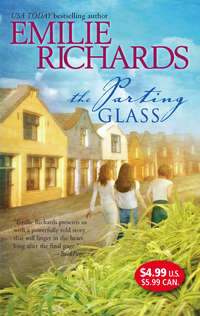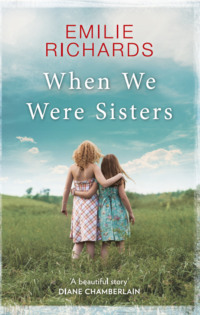
Полная версия
Somewhere Between Luck and Trust
She wondered if Cristy Haviland felt any remorse for walking out of a jewelry store in Yancey County with a diamond engagement ring concealed in her shopping bag. Had giving birth to a son in prison, a son quickly taken away from her, helped her see that the straight and narrow might be a better path through life?
Were the women who laughingly referred to themselves as the anonymous goddesses about to make their first real mistake?
She turned back toward her office. The day was going to be a long one, with a long weekend ahead. All she could do was put one foot in front of the other and hope for the best.
Chapter Two
SAMANTHA FERGUSON WAS sorry the prison hadn’t transferred Cristy to a facility closer to Asheville before her release. Even though she’d had to leave home early, she hadn’t minded the drive to and from Raleigh to pick the girl up. With the help of a travel mug of dark coffee and CDs of Beyoncé and Tim McGraw, she’d made good time.
Unfortunately, by now Cristy would already be exhausted and edgy, and a shorter trip to the Goddess House would have been preferable. Undoubtedly the world was going to seem like a very different place after the months of incarceration, and the young woman would be on emotional and mental overload. In the next weeks she would need rest, good food and good company if she asked for it.
Most of all she would need a chance to begin reassembling the tragic jigsaw puzzle of her life.
A friend on staff at NCCIW had briefed Samantha on today’s procedure. Early rising, breakfast and good luck wishes from the other prisoners in her quad, then transfer to the area where she would be strip-searched before she was allowed to shower and change into the clothing she had arrived in eight months before. She would complete paperwork, take the bag with her belongings and wait outside with one of the officers while Sam pulled around to pick her up.
Finally, after one last stop at the booth where the gate officer would remove the final barrier, Cristy would be free. Her sentence served. Her debt to the good people of North Carolina paid in full.
Her future a question mark.
Samantha had arrived fifteen minutes ago. She had popped the trunk of her car and allowed a hyperactive German shepherd a quick sniff inside, opened the rear doors to show there was nothing on the seat, then waited while a cursory search had been conducted in the front. Now a guard in an official blue uniform motioned for her to get back in to enter the grounds. She knew the routine better than most, because she had helped conduct classes here in the fall.
“She’ll be waiting,” he told her. “They say she’s all set.”
She thanked him and got in her car, pulling it up in front of the gate to be admitted. When the fence swung open, she drove through, ignoring the creeping sensation along her forearms and the way the hair at the back of her neck threatened to rise in protest. She was a law-abiding citizen, the mother of a twelve-year-old honor student, the respected director of a maternal-health clinic in Asheville. But she could never quite silence the voices that reminded her that she, too, could have ended up here. Thirteen years ago if a judge had sentenced her to prison instead of community service, or if she hadn’t heeded the stern lecture he had administered as she stood trembling at the front of the courtroom, she might know firsthand what Cristy Haviland was going through right now.
She could never quite shake the fear that once she was inside the gates, someone would discover a mistake had been made, and she would be required to do hard time after all. Starting immediately.
She pulled to a stop at the appropriate doorway and turned off the engine. When the door opened and Cristy and one of the corrections officers came out, Sam got out and went around to open the passenger door.
She smiled at Cristy, who was sheltering a white plastic bag against her chest. “Let’s ditch this place.”
Cristy, hollow-eyed and unsmiling, gave a brief nod. She turned to the officer and nodded again. “Thank you.”
“Good luck to you.” The woman, bulky enough to be taken seriously, snapped her hand in the air, as if in salute, and stepped back as Cristy got in.
Sam returned to the driver’s seat and started the engine, making a U-turn in the lot to start back toward the gate.
“You can put the bag on the backseat if you’d like.”
Cristy didn’t speak, but she continued to clutch the bag the way a starving woman might clutch a loaf of bread. Samantha waited for the guard to release the gate again. Once it had slid completely open, she touched the gas pedal, and they were outside at last.
She glanced at Cristy. Her wheat-blond hair was a mass of natural curls scrunched on top of her head. Her skin was deathly pale, and her blue eyes were brimming with tears.
Samantha accelerated until they were out on the road and driving away.
“I know it’s hard to believe,” she said, once she was safely in the flow of traffic, “but that part of your life is finished now. You served your time. There’s no mistake.”
Cristy wiped away tears with the tip of her index finger. “No mistake?”
“You’re free. They aren’t going to change their minds.”
“But there was a mistake,” the girl said softly. She turned to look out at the pine-forested scenery, as if to hide more tears.
Samantha wasn’t sure what she meant. “Was there?”
“I just spent eight months in prison for a crime I didn’t commit. And I can never, never get them back again.”
* * *
Cristy was glad when Samantha Ferguson pulled into a McDonald’s parking lot and glided to a space near the door. An hour had passed and they’d said very little to each other. Of course she didn’t blame Samantha for not knowing what to say. What choices had Cristy left her? I’m sorry you were unfairly imprisoned and we’re going to make sure the real thief is caught and punished. Or worse? Unless you admit your guilt and say you want to make amends, I’m not going to be willing to help you after all.
“I’m not an advocate of fast food,” Samantha said, “but if I’d been locked away from it for eight months, I’m pretty sure I’d be yearning for a burger and fries.” She glanced at Cristy and seemed to read the doubt in her eyes. “And hey, I can use the break. It’s my treat.”
Cristy tried to remember the last time she had really felt hungry. Four or five months ago, at the end of the pregnancy, perhaps, when even the prison food had tasted good, and the baby growing inside her had needed calories. But once she had delivered, nothing had appealed to her, and she had rapidly lost not only the baby weight but extra pounds, too, because now the clothes she’d worn to prison hung from her thin frame like a scarecrow’s.
Samantha got out and Cristy knew that she had to, as well. She carefully set the plastic bag at her feet and joined Samantha outside. She was surprised at the burst of noise, at the way cars screeching in and out of the lot throbbed against her eardrums, how, once inside the restaurant, she was blasted with air-conditioning, even though the temperature outside was only in the sixties.
The restaurant had an indoor playground, and as they passed it, she averted her eyes so she wouldn’t have to watch toddlers enjoying themselves as their parents looked on.
“What would you like?” Samantha moved toward the front counter where lines had formed.
Cristy stared up at the menu on the wall, as if deciding. But the words swam in front of her.
“I don’t know,” she said quickly. “I...I’m not really hungry. You go ahead.”
“Why don’t you find us a place to sit then?”
Cristy began to panic. She was used to being told exactly where to go. Here some of the empty tables were littered with paper or trays containing half-eaten food that hadn’t been cleared away. If she sat at one, would employees come to clear it, or would they think the mess was hers and ignore it? Should she take a seat by the window, or would that make somebody angry because those seats were the best? Was it okay to take a table next to one that was occupied, or to avoid the appearance of eavesdropping, should she try to move off to the side, where the tables were smaller, less desirable and mostly empty?
“Try to get us one in the sunshine if you can,” Samantha said, when Cristy didn’t move. “It’s cold in here. How about that one?” She pointed.
Cristy moved in that direction, hoping nobody would beat her to the table. Would Samantha be disappointed if she failed? She had already embarrassed the woman by tearfully proclaiming her innocence. By the end of their trip, would Samantha be so disenchanted she would ask Cristy to find another place to live?
Then where would she go?
She got to the table and gratefully fell into a chair. Around her everyone was going about their business. No one knew her. To them she was a shabby, weary-eyed young blonde. No one knew she had just completed a prison term, or that she was the mother of a son she’d never held.
No one could tell by looking at her that she had fallen so deeply into a well of secrets and lies that she would never find her way out of it.
She could see Samantha placing an order, then stepping to one side to wait. She watched for just a moment. Samantha was a beautiful woman, probably a mixture of races or ethnicities, although Cristy had certainly never asked the particulars. She had a mane of curly, dark hair that fell past her shoulders, more-cream-than-coffee skin, and a narrow, delicately featured face that made Cristy think of the illustration of Pharaoh’s daughter in the Old Testament picture book she’d loved as a child. Samantha was tall, slender and graceful in faded jeans and a dark purple sweater, with a smile that could disarm any enemy at ten paces.
To Cristy she looked like someone who had never known a moment of sorrow in all the twenty-five or thirty years she had lived on earth.
By the time Samantha approached their table and set a tray in the middle, Cristy had turned away from a view of cars zooming through the parking lot to see a wealth of food.
Samantha sounded apologetic. “I have a daughter who just turned twelve, and she’s always hungry. I’m afraid I ordered like she was here with us. You’ll help me eat it?”
Cristy had become an expert at recognizing subtext, one of the things she was taking away from her months behind bars. Samantha had guessed she was hungry, guessed she wanted to eat and guessed that Cristy hadn’t known how to make that happen.
“You’ve already done so much for me,” she said.
“And what good will any of that be if you waste away? How much weight did you lose after the baby?”
Cristy shrugged. “I don’t know.”
“I bet you can do justice to some of this. I really, really hate to waste food.” Samantha began to unload the tray, pushing a red carton toward Cristy. “Big Mac, fries and a Coke. If you want a shake or a smoothie, I’ll get you one, but I thought that might be a bit much with a long car trip. And please, no matter what, when you meet Edna, don’t tell her what we had for lunch.”
Cristy opened the carton and stared. Her mouth began to water.
Samantha opened a similar one and unveiled what looked like a chicken sandwich. She held it out. “I’ll be happy to trade.”
“You’re so nice, and I don’t know why.”
Samantha didn’t look surprised. “And considering where you’ve been and what you’ve learned these past months, you know better than to take anything at face value. I get that. I’d feel the same way in your shoes. I’ll explain the whole thing someday, in detail, I promise. But for now, here’s the gist. I’m friends with a group of women, and we received a bequest when a mutual friend died. She left us a beautiful old log house right between the townships of Luck and Trust in Madison County, the one I told you about in our phone call. She asked us to use it any way we saw fit.”
“Any way?”
“Any way that matters. Specifically as a way to reach out to other women who can use the help. After we met in class, I asked about you, and I was told you needed a place to go when you were released, someplace close enough to Mars Hill that you could visit your son. I realized the Goddess House—that’s what we call it—would be a good place for you to land for a while.”
“That’s it?”
“Yeah, essentially, it is.” Samantha began to eat.
“Why Goddess House? What kind of organization is it?”
Samantha chewed a while and sipped some of her drink before she answered. “It’s not. Not an organization, I mean. We’re just a group of friends.”
“But why goddess? It sounds like some kind of cult.”
“No, there’s just a beautiful story about a Buddhist goddess named Kuan Yin, who died, and on her way to heaven—or whatever Buddhists call heaven—she heard the cry of all the suffering people left on earth. So instead of going to heaven she turned and came back to be with them. She said she couldn’t leave until all their suffering had ended. The story says she’s still with those who need her, an anonymous goddess who helps whenever and whomever she can. Without fuss. Just helps. We’re not that good or selfless. We aren’t saints or goddesses, just women like a million others who find ways to stretch out a hand. But there are things we can do and we try to.”
“And I’m going to be your project.”
Samantha didn’t seem put off by her word choice or tone, which even to Cristy’s ears had sounded rude.
“No. I hope you’re going to be our friend.”
“Why did you ask about me? When you were teaching the class?”
“I honestly don’t know. Maybe because you just seemed more alone than the other women.”
The class had been required for pregnant inmates, dealing with prenatal care, changes in their bodies, what to expect during labor and delivery. Cristy knew that Samantha had volunteered to run it on the nights she was in Durham taking classes at the university to keep her nursing certification current. Cristy didn’t know why, though.
She unwrapped her sandwich and took a tentative bite before she spoke. This hamburger didn’t taste like anything she’d eaten in the past months. In fact, she didn’t want to swallow and lose that initial burst of flavor.
She did swallow finally, then reached for a French fry. “Why were you there in the first place? Were you getting credit for teaching our class, too?”
Samantha smiled a little. “No credit, except maybe with myself. I’ll tell you the story if you’re interested.”
Cristy nodded.
“I had a rough adolescence. I went to a fancy private academy in Asheville where my mom was the headmistress—you’ll meet her this evening—and I hated everything about being there. I was one of three minority students, and that was only one of the many ways I felt different. I reacted by rebelling big-time, notably by drinking. My poor mom tried everything to help, but I was beyond intervention and a great liar. One night I sneaked out and went to a party in the country with a guy I’d met on another night when I’d also sneaked out. You see a theme here, right?”
Cristy felt herself relaxing. She nodded again.
“It was some party. I drank. He drank. We both drank some more. On the way home he kept falling asleep at the wheel, so I made him pull over, then I got in the driver’s seat. I guess I was weaving back and forth and driving too fast, because a cop saw us and tried to pull me over. I remember thinking that was hysterical. So I thought it would be even more fun to see if he could catch me. We raced up and down mountain roads for maybe as far as ten miles. Then I ran off the road and into a drainage ditch and nearly killed the guy I was with. They say he had ninety stitches, on top of internal organ damage and three broken bones.”
Cristy didn’t know what to say. Something was required, though, maybe something that sounded as if she understood, which she did. “I hated high school, too. I quit the moment I could.”
“I know you did. It must have been a hard time for you.”
“What happened next?”
“Speeding to elude arrest is a Class H felony. Luckily for me, my passenger eventually recovered, or things would have been different. But the courts can, if they choose, discharge first offenders under the age of eighteen. I was seventeen when this happened, and even with my many problems, I’d never been arrested. So I was given a year’s probation, otherwise known as a wake-up call. I did community service, started going to AA meetings, finished high school somewhere else and kept out of trouble. Eventually all record of my offense was expunged.”
“You got off then. What does that have to do with teaching at the prison?”
“It wasn’t that simple. My mother lost her job over it, something I still can’t forgive myself for. But I got off, Cristy, because I was lucky. Pure and simple. Not because this was a little infraction, or because I’d been a model citizen. I screwed up big-time, and somehow I was given a chance to have a normal life anyway. It’s been a good life, too, but you know what? I still feel like I owe the universe. I figure teaching at the prison is a way to show I’m thankful for not being a resident there. And a way to give back to everybody who wasn’t as lucky as I was.”
“Like me.”
“Like you.”
“I was twenty-two when I was arrested, and I had a prior conviction.” Cristy chewed on a French fry, then another before she added, “I deserved the first one.” She wanted Samantha to know that, to see she was willing to take responsibility when she should.
“Shoplifting?”
“I was still in high school, right before I dropped out. There was a group of girls I liked, girls like me who didn’t really fit in, and they had this unofficial club. They called themselves the Outsiders. To join I had to go into the hardware store down the street from school and shoplift something. Anything, it didn’t matter, except it had to be over a dollar. One of them waited outside to make sure I didn’t go up to the counter and pay first.”
When she didn’t go on, Sam asked, “So you went along with it?”
“I was a preacher’s kid. By then my parents thought I was beyond redemption, but I’d never done anything illegal, not anything like that. So I was scared but determined.”
“And you got caught?”
“I took the cheapest thing I could find on the aisle farthest from the counter. It was a little pocket tape measure. I figured I would go in later when nobody was watching and tell the clerk I’d walked out by mistake without paying for it, and give him the money. I thought that would make it okay. I stood there for ten minutes trying to make myself slip it in my pocket, and finally I did.”
Samantha waved a French fry. “Uh-oh.”
“Turns out the manager had been watching me. He had figured out what the Outsiders were up to, and he’d noticed the girl waiting outside. So they stopped me when I had one foot out the doorway and called the sheriff. I think they hoped nobody else would try to shoplift after that. As small as it was, it was still on my record when...” She didn’t go on.
“When you were arrested the next time.”
Cristy nodded. “It didn’t help.”
“I guess not.”
They fell silent. Cristy finished half her hamburger, but she realized that was the best she could do. “I’m sorry, but I don’t think I can eat the rest of this. Thank you for buying it for me.”
“You’re very welcome.” Samantha flashed her extraordinary smile, and for a moment Cristy felt warmed by it.
“I noticed a Target in the strip mall over there.” Samantha nodded toward the far door. “That’ll give us a chance to stretch our legs before we get back on the road. You’re going to need some new clothes until you gain back some of the weight you lost. Let’s do a little shopping.”
“I’m sorry, but I just don’t get it. You’re being so nice to me. And you have no reason to.”
“Reason?” Samantha considered. “Here’s my reason, Cristy. We’ve just determined that I was lucky and you weren’t. So let me make a little good luck for you now. It’s as simple as that. Don’t you deserve it?”
Cristy didn’t know. She honestly didn’t know what she deserved anymore. And because she didn’t, she just didn’t answer.
Chapter Three
EVERY DAY AT BCAS was “one of those days.” Georgia knew she was lucky to thrive on variety and problem solving. Even so, by the time the afternoon faculty meeting drew to an end, all the blood had been leeched from her body.
The faculty had come with the job, which Georgia had gotten after the committee’s first choice left the school board high and dry. Unfortunately that woman had also gifted the school with a handful of teachers who saw BCAS as a demotion, even a punishment for infractions they had committed in their lengthy careers.
Passive-aggressive behavior reigned. In classrooms that needed constant stimulation to engage students’ attention, these teachers inevitably showed videos, or assigned long passages to be read silently. They used lesson plans that probably hadn’t worked in former classrooms, and talked about not coddling students. In the future Georgia might be able to replace them, but this year, for better or worse, they were hers. Boring students to death was not a good enough reason to send a teacher packing.
Now, at meeting’s end, she stood to stop one of the worst teachers in the middle of a monologue that was putting the rest of the faculty to sleep. Jon Farrell, a man tantalizingly close to retirement, was moonfaced and pink-cheeked. What was left of his gray hair was trimmed in an old-fashioned flattop stiffened with wax. Jon’s educational theories were of the same vintage.
“Thank you, Jon,” she said. “But I’ve got to cut you off now.” She saw gratitude on the faces of teachers across from her. She insisted the faculty sit in a circle so they could see each other. It wasn’t a popular decision with some, but others appreciated the more democratic approach.
“I’m cutting you off,” she continued, “because I think it’s clear from things that have been said here today that our mission is still a mystery to some of you. I want you to consider carefully what I’m about to say.”
She got to her feet and began to walk around the circle, speaking slowly and deliberately, making eye contact with each willing person there.
“We’re here so students who have no chance in a regular classroom will prove they can excel in ours. We’re not here to teach down to them. We are here to teach up to them. Some of these students are extraordinary. They’re gifted and creative. If we can get through to them, in the not too distant future they’ll be the names we see on award-winning movies and books. Among them might well be the person who finally finds a cure for cancer.”
She stopped, because she was at the end of her round. The room was silent.
“Did anybody think to interrupt me just then?” she asked.
The teachers looked puzzled.
“Did you have time to pass a note or engage in conversation with your neighbor? Did you have time to check your cell phone or text a friend?”
No one answered.
“You didn’t, because I was in your face. I was right there watching you. Not standing over you, but engaging you, right? We locked eyes, at least most of us did. And because we did, you listened harder. You knew listening was important, because most likely whatever I said was going to come up again.”
Jon Farrell’s sneer was reflected in his voice. “You want us to walk in circles?”
“I want you to interact, Jon.”
“None of my kids are going to cure cancer, I can tell you that for sure. Most of them have failed at everything they’ve done. That’s why they’re here.”
“Maybe that’s true of some of our students, but it’s my job as principal to be absolutely certain it’s not true for any of our teachers.”
She glanced at her watch as she let that sink in, then she looked up, her gaze sweeping the room. “Nobody has to stay. If you’re unhappy, or you feel the energy and innovation required here are too much to handle, then we can talk privately. But those who continue? Evaluations are about to begin. I’ll be visiting classes in the next few weeks, along with our parents’ committee and the students elected to accompany them. The evaluation process should be a good one, a chance to receive helpful feedback and new suggestions. Just be prepared. Try your best ideas and see what happens. See you next week.”







